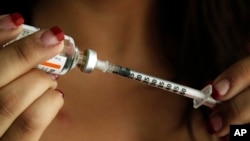Researchers have developed a “smart” insulin that automatically regulates the amount of blood sugar in people with type 1 diabetes. This would be a breakthrough for patients, who struggle every day to maintain healthy blood glucose levels.
Type 1 diabetes occurs when the body’s immune system attacks and destroys its own insulin-producing pancreatic cells. Insulin is a hormone that helps metabolize glucose from food, which cells use for fuel.
People with type 1 diabetes must frequently check their glucose levels and inject themselves with insulin, sometimes many times a day. But the routine is imprecise.
Too little insulin causes a rise in blood sugar levels that over time can lead to serious complications, including heart disease, kidney failure and blindness. But if type 1 diabetics accidentally take too much insulin, they risk falling into a dangerous coma.
“The idea, I think, the kind of the pie in the sky vision so to speak, would be to have something that is completely autonomous. So, if a patient didn’t have to check their blood glucose level, if they could take a shot in the morning and know that they are covered for the day, that would be the best case scenario. I don’t think what we have now is there yet. But I think that’s where the generation of a truly “smart” glucose response insulin would go," said Webber.
Matthew Webber is a biomedical engineer at Massachusetts Institute of Technology who helped develop a “smart” insulin that self-activates when blood sugar levels rise.
A single injection of the long-acting agent binds to glucose molecules circulating in the blood, automatically bringing blood sugar levels down when they soar.
Webber says researchers conducted tests using laboratory animals.
“We can inject it in mice and when we simulate a meal three hours following insulin administration, blood glucose level[s] in our treated group goes up and comes right back down the way you would expect in a healthy animal. If we give the animals regular insulin, the kind of stuff a diabetic patient might take, the blood glucose level goes up and stays up. So, it has a longer lasting effect and it also has a very rapid reversal of blood glucose," he said.
The test showed that the “smart” insulin worked for at least 14 hours, repeatedly and automatically lowering blood sugar levels in the mice.
The work was published in Proceedings of the National Academy of Sciences.
Researchers are hoping next to conduct human clinical trials of what would be the first glucose-response insulin.









